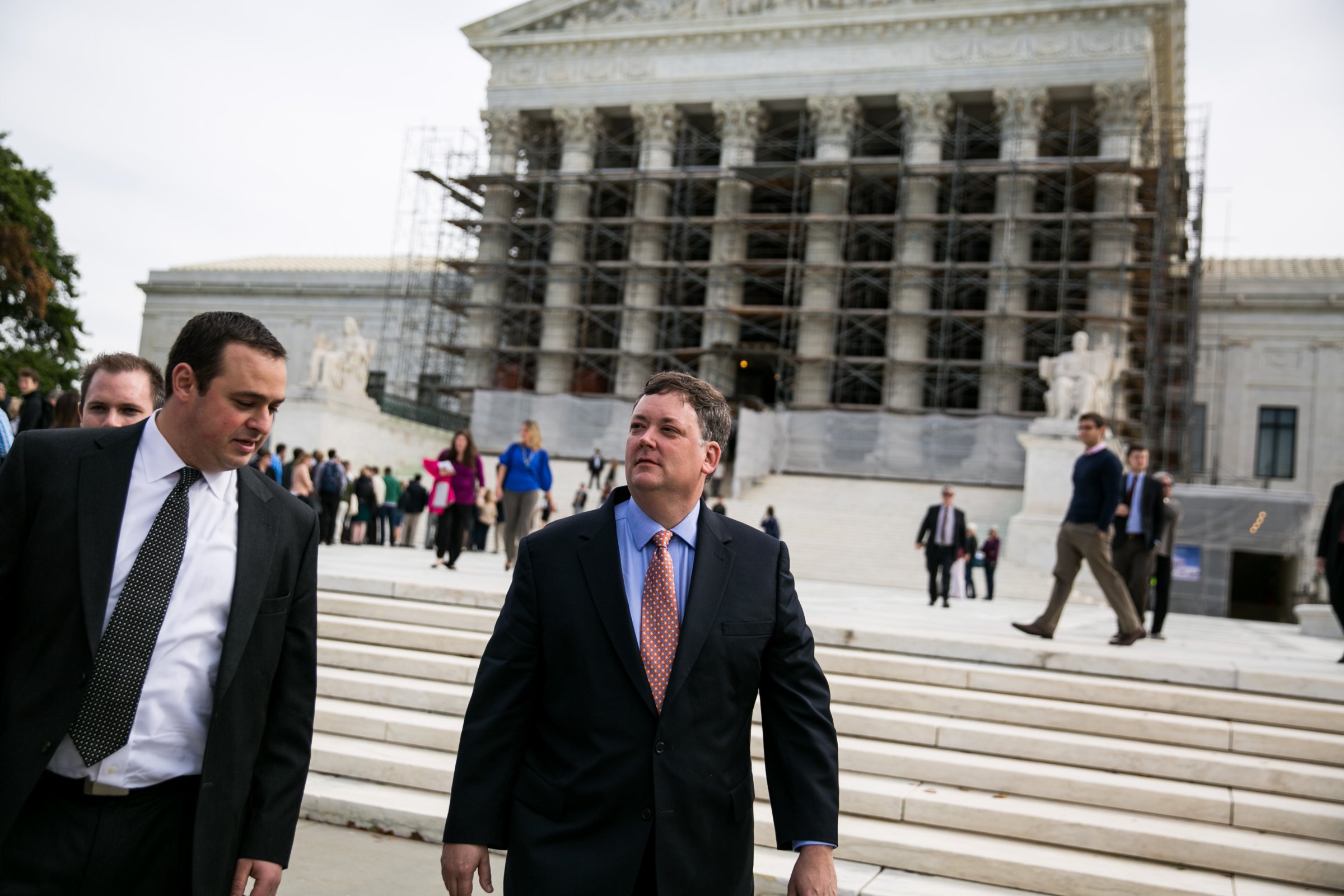
Shaun McCutcheon was at the 2011 Young Conservatives Coalition’s Reaganpaolooza party in Washington D.C. when he met attorney Dan Backer, an expert in campaign finance. Backer was sipping a cocktail when he began chatting with the fortysomething electrical engineer-turned-political financier. The two hit it off, and McCutcheon ended up recruiting Backer to help increase his financing of conservative candidates.
Within three years, Shaun McCutcheon and Backer had brought one of the biggest ever cases on campaign finance reform to the Supreme Court — and won. Wednesday’s decision in McCutcheon v. Federal Election Commission will usher in a new era of political spending as donors can now spend in aggregate an unlimited amount of money on political parties and campaigns. But how did an unknown Alabama electrical engineer make history at the Supreme Court?
McCutcheon’s case has impressive implications. A single donor can now theoretically spend up to $3.5 million supporting each and every candidate for the House and Senate as a result of Wednesday’s ruling, a figure that doesn’t include contributions to political action committees. Overall, political campaign contributions have skyrocketed in recent years as laxer regulation has led famous millionaire moguls like the conservative Sheldon Adelson and left-leaning Tom Steyer to loosen their purse strings. Total election spending in 2012 reached nearly $4.2 billion, compared with the $1.7 billion spend in 2000, according to the Center for Responsive Politics. For McCutcheon, political giving is a question of personal freedom.
“The more you analyze the free speech and constitutional right,” McCutcheon tells TIME, “the more you recognize that this fundamental free speech is so critically important to getting ideas out there and creating competition in the election process.”
McCutcheon studied electrical engineering at Georgia Tech, where he first became interested in politics after taking a political science course. After he graduated he began working as an electrical engineer, installing motor drives and electrical equipment for behemoth American manufacturing industries and founding his own company, Coalmont Electrical Development Corp. in 1996 to serve heavy industry.
Politics began as a hobby for McCutcheon. By the late 1990s, he and his friends had noticed a serious decline in the manufacturing industries he served as steel, paper and aluminum plants packed up and shipped overseas. “When we started, you wanted overtime, and everyone was expanding. But the last 10 years has been a real bad decline,” McCutcheon said. “It’s nothing like it was in the 80s and 90s.” He began contributing to Republican candidates he believed were pro-business.
McCutcheon’s management role as CEO of Coalmont was not onerous, and increasingly gave him time to assist conservative Republicans with their campaigns. He joined the Jefferson County Republican Party and Executive Committee and began supporting an eclectic range of conservative figures. In 2010, for example he helped the gun-slinging Alabama state official Dale Peterson distribute cowboy hats at a Washington D.C. event, Backer told TIME. But as his political involvement increased in 2012, McCutcheon found that he was fast reaching a limit to the number of candidates he could contribute to.
McCutcheon went to Backer, who proposed a bold plan to challenge political contribution rules. “If you really don’t like those (rules), we could just challenge them,” Backer said at the time, McCutcheon recalls.
“The idea of it sounded wonderful—right down my alley—but I was a little skeptical of being able to accomplish it,” McCutcheon said.
But after some persuasion from Backer, McCutcheon decided to file a lawsuit against the Federal Election Commission, and the case rose through the courts with help from the Republican National Committee.
Critics of McCutcheon’s campaign have expressed dismay about the growing amount of money influencing political campaigns. Though McCutcheon and others have said that the ruling will merely increase the total number of candidates donors can contribute to, Justice Stephen Breyer said in his dissent to the 5-4 decision that the move will “create a loophole that will allow a single individual to contribute millions of dollars to a political party or to a candidate’s campaign.”
But McCutcheon believes fewer restrictions on spending will allow more candidates to run for office, which he says would be good for politics in general. “Competition will bring improvement I believe. We need to get more good ideas and more good candidates into the process,” he said. “Political donors won’t max out on nine or ten candidates and they can potentially fund more challengers versus incumbents.”
That belief appears at odds with the views of a large majority of Americans. A Gallup poll found in June that 8 in 10 Americans would vote to limit the amount of money to candidates for Congress, given the opportunity.
McCutcheon said that, for him, the case was really about personal freedom. “I don’t think we ought to stay up all night with a spreadsheet figuring out what we can do and can’t do in a free society in terms of spending money on political ads.”
Backer agreed. “For Shaun, this wasn’t about some esoteric legal concept,” he said. “This was about his rights and his freedom. That’s what motivated him to bring the case.”
More Must-Reads from TIME
- Donald Trump Is TIME's 2024 Person of the Year
- Why We Chose Trump as Person of the Year
- Is Intermittent Fasting Good or Bad for You?
- The 100 Must-Read Books of 2024
- The 20 Best Christmas TV Episodes
- Column: If Optimism Feels Ridiculous Now, Try Hope
- The Future of Climate Action Is Trade Policy
- Merle Bombardieri Is Helping People Make the Baby Decision
Contact us at letters@time.com